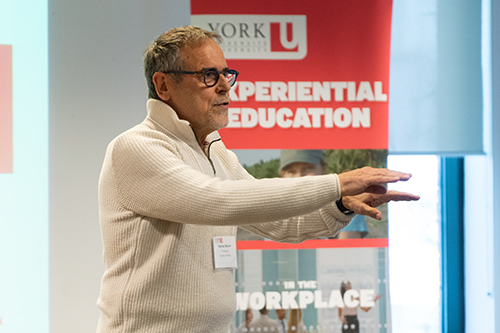Trying to manage the stress of the holiday season can be overwhelming, but there are ways to stay grounded and calm. York University Professor Harvey Skinner shares some of his stress-busting tips.
By Ashley Goodfellow Craig, YFile deputy editor
As much as the holiday season can spark joy, it can also be a time of stress, anxiety and difficulties. There are a number of factors that contribute to holiday-related stresses: finances, family, work/life balance, grief and more. Add in a second year of pandemic-related restrictions on travel and gatherings, and we might even expect these feelings to be heightened through December and into the new year.

There is a way, says York University Faculty of Health Professor Harvey Skinner, to help mitigate the negative effects of a stressful situation over the holidays, and it starts with a little self-reflection.
Skinner, is a professor of psychology and global health, and was the inaugural dean of the Faculty of Health. He is a teacher in managing stress and leads a popular Stress Busting series at the University that focuses on how Qi Gong and mindfulness meditation practices can empower health and well-being.
Taking time to look back at past experiences over the holiday season, and recognizing that expectations may be idealistic, is key to coping with potential stressors, he says.
“We often have this idealistic expectation of a holiday and how wonderful it is … so we don’t go into it prepared,” he says. “It’s like going for an exam, or for a vacation – you wouldn’t do those things without a plan.”
The simple act of just having a plan in place can help to minimize anxiety, says Skinner. Also being aware of physical and emotional symptoms that signal stress, such as feeling uncomfortable, experiencing a sinking feeling, having an upset stomach or agitated nerves – these are all common feelings that can happen before the mind is triggered to respond.
“The notion is understanding from your previous experience how stressful your holidays have been, and from there, develop a plan, anticipate what would be the triggers … and if you do this kind of preparation then when you are in the moment you will have one or two little mechanisms to help you cope.”

Skinner suggests slow, deep, thoughtful breathing exercises as an easy and effective way to manage stress; there’s a reason why we’re told to “take a deep breath” when we are feeling stressed, anxious or nervous. The act of slow, intentional breathing in and out through the nose activates the parasympathetic nervous system which aids in relaxation and counters the sympathetic system, or fight-or-flight response. An example of this type of breath work is called “coherent breathing.” To do this, he suggests you sit (stand or lie down) relaxed in a quiet space, soften your gaze or close your eyes, and begin inhaling slowly through the nose (counting from one to five) and exhaling slowly through the nose (counting from five to one), and repeat.
To help with keeping the mind focused, Skinner suggests a practice called “box breathing.” Visualize the shape of a box with each step of breathing: inhale slowly going up the side of the box, pause in breathing along the top of the box, exhale slowly down the other side of the box, pause in breathing along the bottom of the box, and repeat.
“Extending the out breath helps activate the parasympathetic system,” says Skinner, adding that this results in lower blood pressure, and lower heart rate and a feeling of calmness.
Breathing exercises are also fundamental to many wellness practices, such as mindfulness meditation, yoga, Tai Chi or Qi Gong.
“It’s good to practice these things beforehand, indeed make them a part of your daily life, because then they are there for you – the more you do them, the easier it is to use them,” says Skinner, who leads Qi Gong with his students at the beginning of class to help everyone feel calm, centred and ready to learn.
There are other methods that also work, including finger holds. In this practice, each finger is associated with a specific feeling – such as grief, anxiety, anger, etc. – and holding onto a finger with the other hand for one to two minutes, paired with slow breathing, helps to visualize and release those emotions.
During this holiday time with more inherent levels of stress, such as the pandemic, Skinner suggests including these practices in holiday planning. And remember to be kind to yourself.
“Just go gentle on yourself, give yourself permission to be kind-hearted; it has been a really tough year. Try to make the holiday season the best you can – although it likely won’t be perfect. You know from the past the things that might go wrong. But if you have some these practices in your toolkit, you are going to feel prepared. And when you feel prepared, that alone will help lower your anxiety level.”
For more on Skinner’s Stress Busting series, or to watch recordings of previous seminars, visit the Stress Busting website.


